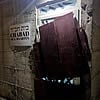While nervously awaiting a potentially catastrophic deluge from Hurricane Irma on Tuesday night, Rabbi Shimon Pelman and 70 other people at Chabad-Lubavitch of Dominican Republic honored a place that people expect to be filled with water.
After two years of planning and construction, the Jewish center on the Caribbean island held an inauguration for its new mikvah, a bath used by women for ritual immersion as part of the Jewish laws associated with family purity.
Shortly afterwards, seven guests headed to Las Americas International Airport in the attempt to leave, though for a while, flights were not available.
The rest of the inauguration attendees tried to find safety on the island and “survive with the storm,” said Pelman, who has lived in Santo Domingo for a decade. Guests from the United States managed to fly out Wednesday morning.
A day later, the Category 5 storm had decimated Barbuda, and plowed through St. Barts, St. Martin, Anguilla and the British Virgin Islands with winds of up to 185 mph, causing extensive—and in some places, almost complete—damage. It also touched down on the U.S. Virgin Islands and Puerto Rico.
Gaston Browne, the prime minister of Antigua and Barbuda, said the storm destroyed 95 percent of the structures on Barbuda, an island with a population of just 1,600 people.
Meanwhile, Pelman, his wife Michal and their five children waited for the winds to blow their way. The storm was expected to hit the island on Thursday morning.
He was worried about the Chabad emissaries in St. Thomas and St. Martin—he had not been able to reach them—and people around the Dominican who lived in homes that couldn’t possibly withstand Irma’s force.
He had seen guests head to the airport but said he never considered evacuating.

“We have to stay,” insisted Pelman.
He referenced a letter that the Lubavitcher Rebbe—Rabbi Menachem M. Schneerson, of righteous memory—had once sent to a rabbi in Morocco, who told the Rebbe that it was dangerous to be Jewish and walk the streets during the 1967 Six-Day War in Israel. The Rebbe told him: “You are the mezuzah of the town. You have to stay,” related Pelman.
“You have to stay in order to help other people,” he emphasized.
Never Faced Anything on This Scale
Now, Pelman is focused on making sure that his own family is safe while at the same time assisting others on the island.
He has spoken with young Israeli couples who were vacationing in Punta Cana and other parts of the country, and invited them to stay at the Chabad center. They have three rooms there and have rented out several rooms at a hotel next door.
On Wednesday, Pelman and his family moved furniture and books from the first floor of their home to the second floor in case of flooding. They checked the generators. And they baked challah and prepared other food needed for Shabbat.

When they went to bed that night, they weren’t sure when the storm would arrive or what it would bring. Pelman, an Israeli native, said he was thinking about Dominican and Haitian people who reside on the island. The Red Cross and other aid organizations have a significant presence there, he said, and he is confident in the ability of the hospitals to care for people. But one-third of the country of 10 million people live at or below the national poverty line, according to the World Bank.
“The problem is the poor ... have very poor houses. This is very sad to see—to see the rain melt the house, and they stay with no roof. I think this time, hundreds of thousands of people will be homeless,” said Pelman.
On Thursday morning, the rabbi looked out his window and saw a tree with coconuts hanging from branches. He was worried that the fruit could become projectiles in the storm and possibly fly through a window, so he paid a Haitian man to cut them down. Then they parted ways.
Pelman’s home flooded during a tropical storm seven years ago, but he said he has never faced anything on the scale of Irma. He saw, however, how a 2010 earthquake in Haiti disrupted the lives of more than 3 million people. The Chabad center sent hundreds of trucks with supplies at the time and also “adopted” a school, providing students with supplies and other essentials each year.
If needed, Pelman is prepared to make the same effort in the Dominican Republic.
“We are the only Jewish institution in the country,” he said. “And we need to light the world with goodness.”









Start a Discussion